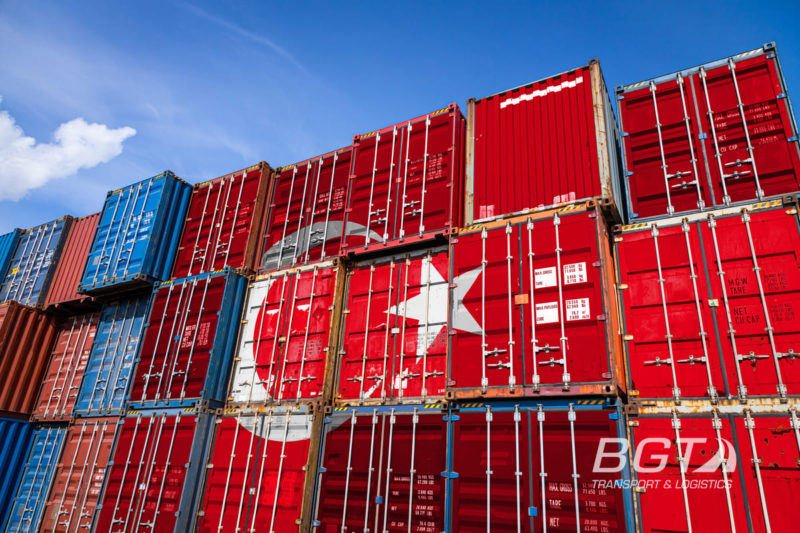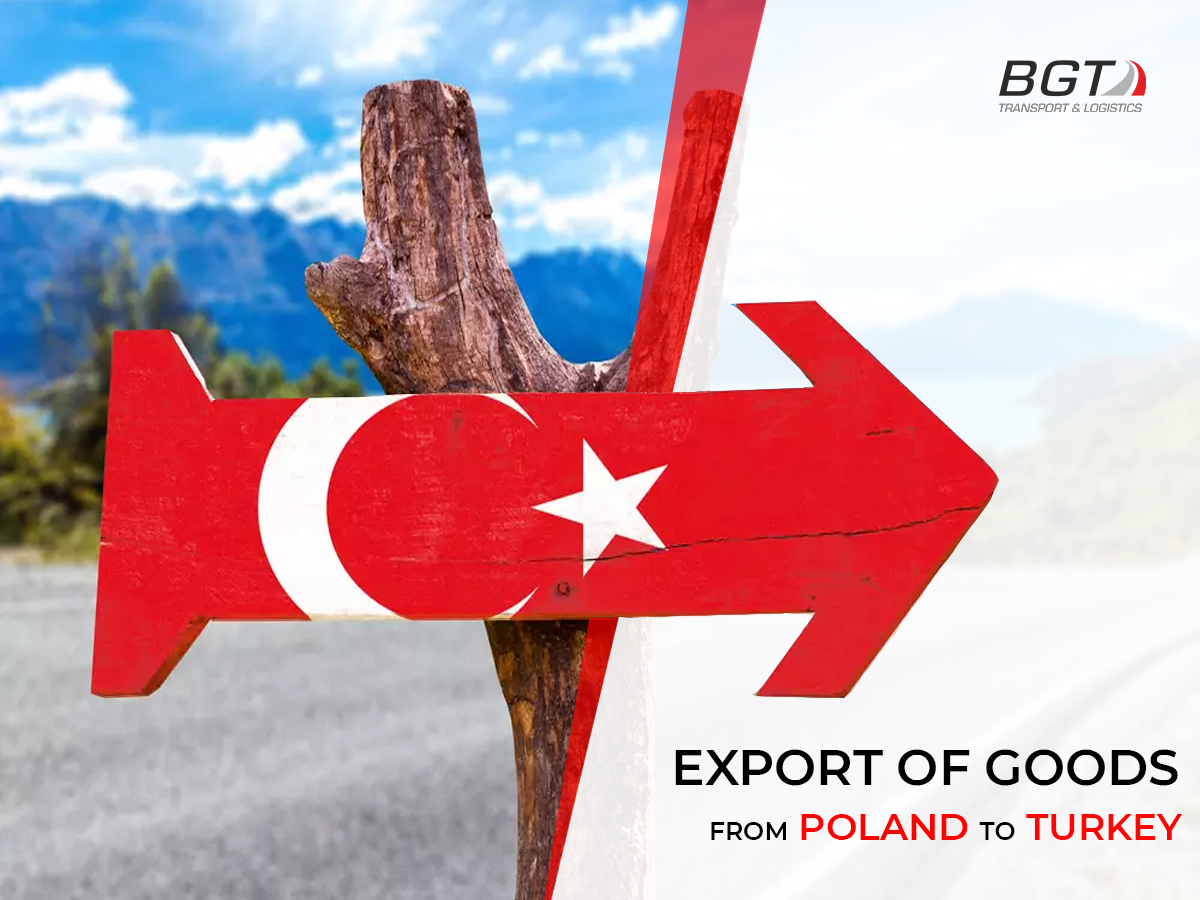Poland holds a significant position in the export market of Central and Eastern Europe, with Turkey being a key trading partner. Turkey imports a wide range of Polish products, spanning both consumer and industrial goods. In this article, we will provide essential information on the necessary export documentation, customs and tax procedures, the most commonly exported goods, and the specific customs requirements for exporting to Turkey.
Table of contents:
-
-
- Exporting to Turkey and customs – what is worth knowing?
- Required export documents
- Customs and tax procedures
- Why is it worth exporting to Turkey?
- Most frequently exported goods from Poland to Turkey
- Polish beef producers on the Turkish market
- Exporting jewelry to Turkey
- Regulations and challenges in arms exports from Poland to Turkey
- Cattle exports to Turkey: challenges and opportunities for Polish producers
- Customs duties and auto exports to Turkey
- Comprehensive service of import and export from Turkey by BGT company
-
Exporting to Turkey and customs duty – what is worth knowing?
When exporting to Turkey, it’s important to be mindful of customs duties, as Turkey applies varying duty rates depending on the type of goods and their origin. Familiarizing yourself with the trade agreements between the European Union and Turkey can be beneficial, as these agreements may offer reduced duty rates for certain goods.
Properly preparing customs documentation is crucial to avoid delays and issues during customs clearance. Engaging experienced customs agents is advisable, as they can assist in preparing the necessary documents and managing the entire customs clearance process efficiently.
Required export documents
Exporting goods from Poland to Turkey involves the preparation of relevant documents. The most important of these include:
-
- Commercial Invoice – should contain detailed information about the seller, buyer, description of goods, quantity, unit price and total value.
- Packing List – contains detailed information about the contents of each package, which facilitates customs and tax inspection.
- Certificate of Origin – confirms the origin of the goods and may be required by Turkish customs authorities.
- Export Declaration – a document required by Polish customs authorities, containing detailed information about the goods.
- Transport Documents. Depending on the mode of transport (e.g., bill of lading for sea, waybill for air or land), different documents may be necessary.
- Phytosanitary/veterinary certificate – required for export of agricultural and animal products.
Customs and tax procedures
When exporting to Turkey, you must follow the applicable customs and tax procedures. Here are the steps that must be taken:
-
- Customs declaration – goods must be declared for customs clearance. For this purpose, the relevant customs documents must be completed and submitted to customs.
- Customs inspection – the goods may be subjected to customs inspection, in which the conformity of the documents with the actual state of the goods and their legality are checked.
- Customs fees – depending on the type of goods, different customs rates may apply. It is important to be thoroughly familiar with the applicable customs regulations in Turkey.
- VAT – there is VAT in Turkey, which can range from 1% to 18% depending on the type of goods.

Why export to Turkey?
Turkey is one of the largest markets in the Middle East and Central Europe region. Its strategic location and booming economy make the country an attractive destination for Polish exporters. Benefits of exporting to Turkey include:
-
- Large market. With a population exceeding 80 million, Turkey offers one of the largest consumer markets in the region.
- Growing demand for a variety of products. Turkey imports a wide range of goods, from food to industrial machinery, creating opportunities for a variety of industries
- Stable economic growth. Despite some economic challenges, Turkey maintains stable economic growth, which is conducive to foreign trade.
The most frequently exported goods from Poland to Turkey
Poland exports a variety of goods to Turkey. Among the most frequently exported are:
-
- Machinery and mechanical equipment – agricultural machinery, industrial machinery and spare parts.
- Chemical products – such as fertilizers, pharmaceutical products, and cosmetics.
- Metal products – steel, cast iron and base metal products.
- Food products – dairy products, meat, cereals and confectionery.
- Vehicles and automotive parts – both finished vehicles and components.
- Wood products – furniture, structural timber and other wood products.
Polish beef producers on the Turkish market
Polish beef is highly regarded in foreign markets due to its high quality and competitive price. The export of beef from Poland to Turkey is one of the most important sectors of agriculture. As one of Europe’s largest beef producers, Poland is well-positioned to supply significant quantities of meat to foreign markets, including Turkey. The Turkish market appreciates the high quality of Polish beef, which is conducive to the further development of trade relations in this sector.
Jewelry exports to Turkey
Polish jewelry is gaining popularity in the Turkish market. Jewelry exports include gold and silver products, as well as those decorated with precious stones. The Turkish jewelry market is one of the largest in the world. The export process involves not only ensuring compliance with local customs and trade standards and regulations, but also the need to tailor offerings to the cultural and aesthetic preferences of Turkish customers.
Regulations and challenges in arms exports from Poland to Turkey
Arms exports to Turkey are subject to strict regulations, both domestic and international. Poland, being a member of the European Union, must comply with EU regulations on arms export control, which are designed to prevent illegal use. Poland, having a well-developed arms sector, supplies Turkey with a variety of products, including small arms, ammunition and military equipment.
Cattle exports to Turkey: challenges and opportunities for Polish producers
The export of cattle from Poland to Turkey is carried out in accordance with the strict veterinary and health standards of both countries. The process requires meeting a number of animal health requirements and strict sanitary and veterinary controls both before shipment and upon arrival in Turkey. Poland is known for its high quality cattle, making it an attractive export product for Turkish meat and livestock markets.
Customs duties and car exports to Turkey
Turkish duties on car imports are relatively high, which poses a challenge for Polish exporters. The high duties are designed to protect the domestic auto industry, which affects the competitiveness of imported vehicles. Additionally, cars must meet Turkish technical and environmental standards, which requires Polish manufacturers to adapt their products to meet local requirements.
Comprehensive service for import and export from Turkey by BGT company
BGT offers comprehensive services for import and export from Turkey, providing assistance in arranging customs clearance in both Poland and Turkey. Our services include road transportation from and to Turkey.



